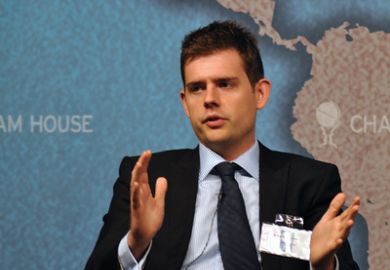Following his departure from the University of Kent last month, Matthew Goodwin has joined a small but growing band of high-profile academics operating outside the formal university system.
The political scientist left amid Kent’s financial turmoil, but his position had been under question for some time due to his increasingly populist commentary on issues such as the recent right-wing unrest in the UK.
In leaving, Professor Goodwin appears to have bet his future on monetising this analysis, primarily through his Substack page, which he claims is “one of the biggest in the UK”.
But he has also been at pains to retain his scholarly credentials, emphasising his “honorary professorship” at Kent – a time-limited status granted to all departing professors – and telling Times Higher Education he plans to announce further research projects imminently. He is, in his own words, “still firmly an academic”.
“He has chosen Faragism over academia but his USP in his new milieu still depends on eking out his academic credibility,” said Martin Shaw, emeritus professor of politics at the University of Sussex and author of Political Racism: Brexit and Its Aftermath.
“I can’t see him resuscitating his career in a British university, but his precise academic status doesn’t matter to his online audience.”
King’s College London professor Jonathan Portes – who has repeatedly clashed with Professor Goodwin despite them both once being members of the UK in a Changing Europe initiative – said his former colleague was “obviously not an academic now any more” but that did not mean academia couldn’t be home to controversial views.
Others were less sure. Joanna Williams, who left her post as senior lecturer in higher education at Kent five years ago and has since worked primarily in thinktanks and journalism, said she felt only those whose opinions are “in line with the dominant views of the academy” have “great freedom to speak out”.
Those who do not conform suffer in their careers as a result, said Dr Williams, who, like Professor Goodwin, has been a supporter of Brexit and gender-critical views.
Dr Williams likened her move to that of the politician Tony Benn, who famously said he left Parliament to “spend more time on politics”.
“I left the university to be able to pursue academic work because I did not have that intellectual freedom within the university structures,” she said.
Whether or not she was still an academic was an open question, she added.
“If the definition of an academic is somebody employed by a university, then I’m obviously aware I’m not that, I don’t fit the criteria,” she said.
“But if an academic is somebody who is engaged in intellectual work, in research, in contributing to the development and pursuit of ideas, then I absolutely see myself in that regard. If an academic is an identity, then that is how I identify.”
Dr Williams and Professor Goodwin have both argued that those with more leftist views have greater freedom to express their views from within the walls of the academy.
But Rupert Read, a former Green Party politician and co-founder of environmental activist group Extinction Rebellion, said he too had faced hostility while working as a reader in philosophy at the University of East Anglia, a position he left last year.
Dr Read alleged that early on in his career, as he became more involved in political causes, a former vice-chancellor had tried to get rid of him and he had been told to choose “if your path is going to be political or strictly academic”.
This changed, he said, with the birth of the impact agenda, which, although “extremely imperfect”, had shown universities the value of academics doing outside work, and his former department had ended up submitting some of his work with Extinction Rebellion as a case study for the Research Excellence Framework.
Dr Read said that despite this he had felt increasingly dissatisfied with academia before his eventual exit and had found much of the work he has done since to be “more intellectually satisfying”.
“You encounter prejudices [in universities], including, ‘maybe you are not interested in thinking any more’ because you are more interested in doing,” he said.
“Or ‘you have a bias because of the party you are affiliated with’. Of course, these things are possible but that doesn’t mean they are true.
“The academy could be more welcoming to people who are outsider-insiders and who are seeking to not be just ivory tower thinkers.”
Dr Williams said leaving a university role to have more freedom to speak out inevitably involved a trade-off between intellectual freedom and financial security.
“I don’t earn what I did but I’m not starving and I’m enjoying life – it is a fair trade-off. I’m sure that will be the case for Matthew as well with his Substack and other offers of work. He’s going to have his freedom to say what he wants and live comfortably, I’m sure. Ultimately, I think who loses is academia and students.
“The more academia becomes conformist, with the more contrarian, different viewpoints taken out, the more the disciplines suffer, and the more students suffer.”
Register to continue
Why register?
- Registration is free and only takes a moment
- Once registered, you can read 3 articles a month
- Sign up for our newsletter
Subscribe
Or subscribe for unlimited access to:
- Unlimited access to news, views, insights & reviews
- Digital editions
- Digital access to THE’s university and college rankings analysis
Already registered or a current subscriber?








